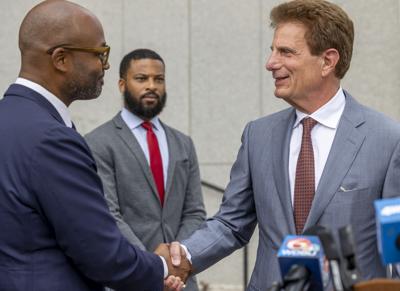A hallmark of Jason Williams's administration ever since he became Orleans Parish district attorney in 2021 has been a willingness — nay, an eagerness — to put crack defense and appellate attorneys on his payroll.
This is no great shock, since Williams only got himself elected as New Orleans' top prosecutor after a long career on the other side of the aisle keeping clients out of jail. Thus he came to office tagged as a liberal reformer, creating, for instance, a civil rights division and poaching Emily Maw from the Innocence Project in New Orleans to take charge of it.
But “stare decisis” has remained the watchword even when the U.S. Supreme Court has appeared to lose its mind, as it did spectacularly in 1972 when ruling that unanimous verdicts were a constitutional imperative in federal criminal trials but that a majority was good enough for the states.
The notion that our top court could endorse a legal double standard struck most states as so bizarre that they declined to follow suit and only two — this one and Oregon —allowed majority verdicts. That goofy state of affairs continued until the Supreme Court regained its senses and reinstated the unanimity requirement in 2020.
Why Louisiana and Oregon should have adopted systems clearly inimical to minority interests is not so hard to understand when you consider the political climate of the respective states when the criminal codes were adopted. Louisiana's majority verdict requirement was enshrined in a late 19th century state constitution that was a hymn to White supremacy, while Oregon's was conceived in a fit of antisemitisn.
The attorney who spent years talking sense to the justices until they could deny it no longer was Ben Cohen of New Orleans' Promise of Justice Initiative, whose reward for what must rank as a historic coup was to be made Williams' chief of appeals.
By now the hot shots of the DA's office were quite likely to have been trained by their natural adversaries. A certain amount of confusion and resentment seems inevitable.
Wherever they came from, Williams' assistants will now be rubbing shoulders with some unfamiliar colleagues in the shape of staffers from Morris Bart's office. Bart, in what he attributes to a sudden access of pro bono, is volunteering his staff to supplement Williams' in the cause of restoring order on the streets of New Orleans.
It is not immediately clear how much help a civil law firm — some would say a group of ambulance chasers — can usefully provide prosecutors, but Bart's boys do get credit for a facility in getting their hands on medical records. There is no surer way than that to get on the right side of an ambulance chaser.
Bart must be the ambulance chaser's ideal. He's been in business since 1980, offering in TV commercial after TV commercial to obtain generous court settlements for people injured in road accidents.
When it became legal for attorneys to hawk their services in 1977, Bart became the first in Louisiana to take advantage, and nobody can deny he has proved remarkably adept at building up a prosperous practice through advertising.
Attorneys of a more conservative stripe have looked down their noses at their brasher brethren since Day One, but now that Bart can afford to help out the DA, he does not appear bothered.
Email James Gill at gill504nola@gmail.com.

